Related Research Articles

The Battle of Gettysburg was fought July 1–3, 1863, in and around the town of Gettysburg, Pennsylvania, by Union and Confederate forces during the American Civil War. In the battle, Union Major General George Meade's Army of the Potomac defeated attacks by Confederate General Robert E. Lee's Army of Northern Virginia, halting Lee's invasion of the North. The battle involved the largest number of casualties of the entire war and is often described as the war's turning point due to the Union's decisive victory and concurrence with the Siege of Vicksburg.

Robert Edward Lee was a Confederate general during the American Civil War, towards the end of which he was appointed the overall commander of the Confederate States Army. He led the Army of Northern Virginia—the Confederacy's most powerful army—from 1862 until its surrender in 1865, earning a reputation as a skilled tactician.
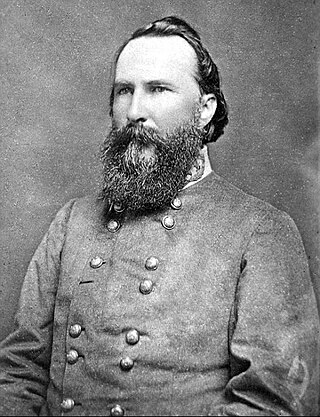
James Longstreet was one of the foremost Confederate generals of the American Civil War and the principal subordinate to General Robert E. Lee, who called him his "Old War Horse". He served under Lee as a corps commander for most of the battles fought by the Army of Northern Virginia in the Eastern Theater, and briefly with Braxton Bragg in the Army of Tennessee in the Western Theater.
Albert Peter Dewey was an American Office of Strategic Services operative shot to death in a case of mistaken identity by Communist aligned Viet Minh troops on September 26, 1945. Dewey was the first American fatality in French Indochina, killed during the 1945 Vietnamese uprising.

George Edward Pickett was a career United States Army officer who became a major general in the Confederate States Army during the American Civil War. He is best remembered for being one of the commanders at Pickett's Charge, the futile and bloody Confederate offensive on the third day of the Battle of Gettysburg that bears his name.

Henry Robinson Luce was an American magazine magnate who founded Time, Life, Fortune, and Sports Illustrated magazine. He has been called "the most influential private citizen in the America of his day".

Richard Stoddert Ewell was a career United States Army officer and a Confederate general during the American Civil War. He achieved fame as a senior commander under Stonewall Jackson and Robert E. Lee and fought effectively through much of the war, but his legacy has been clouded by controversies over his actions at the Battle of Gettysburg and at the Battle of Spotsylvania Court House.
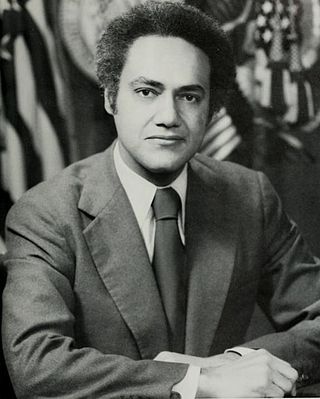
Clifford Leopold Alexander Jr. was an American lawyer, businessman and public servant from New York City. He first served on the National Security Council during the Kennedy administration, before becoming chairman of the Equal Employment Opportunity Commission in 1967. He was appointed Secretary of the Army a decade later, becoming the first African American to hold the position. He served in that role until 1981.

The Killer Angels is a 1974 historical novel by Michael Shaara that was awarded the Pulitzer Prize for Fiction in 1975. The book depicts the three days of the Battle of Gettysburg during the American Civil War, and the days leading up to it: June 29, 1863, as the troops of both the Union and the Confederacy move into battle around the town of Gettysburg, Pennsylvania, and July 1, July 2, and July 3, when the battle was fought. The story is character-driven and told from the perspective of various historical figures from both the Confederacy and the Union. A film adaptation of the novel, titled Gettysburg, was released in 1993.
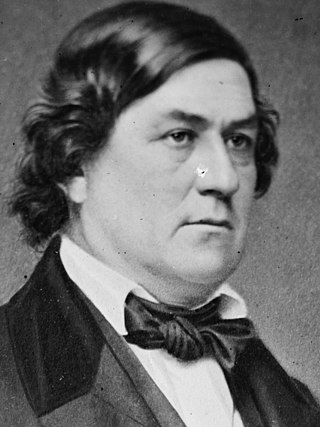
Robert Mercer Taliaferro Hunter was an American lawyer, politician and planter. He was a U.S. representative, speaker of the House (1839–1841), and U.S. senator (1847–1861). During the American Civil War, Hunter became the Confederate States Secretary of State (1861–1862) and then a Confederate senator (1862–1865) and critic of President Jefferson Davis. After the war, Hunter failed to win re-election to the U.S. Senate, but did serve as the treasurer of Virginia (1874–1880) before retiring to his farm. After fellow Democrat Grover Cleveland was elected President of the United States in 1884, Hunter became the customs collector for the port of Tappahannock until his death.
The Stonewall Brigade of the Confederate Army during the American Civil War, was a famous combat unit in United States military history. It was trained and first led by General Thomas J. "Stonewall" Jackson, a professor from Virginia Military Institute (VMI). His severe training program and ascetic standards of military discipline turned enthusiastic but raw recruits into an effective military organization, which distinguished itself from the First Battle of Bull Run in 1861 to Spotsylvania Court House in 1864. Its legacy lives on in the 116th Infantry Brigade, which bears the unofficial nickname "Stonewall Brigade," and in several living history reenactment groups.
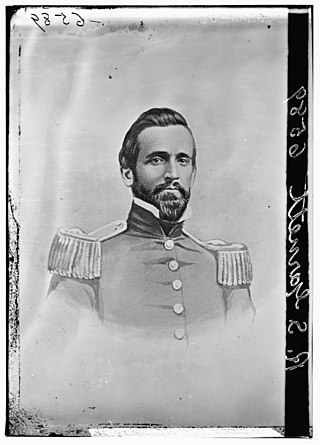
Richard Brooke Garnett was a career United States Army officer and a Confederate general in the American Civil War. He was court-martialed by Stonewall Jackson for his actions in command of the Stonewall Brigade at the First Battle of Kernstown, and killed during Pickett's Charge at the Battle of Gettysburg.

William Shield McFeely was an American historian known for his Pulitzer Prize-winning 1981 biography of Ulysses S. Grant, as well as his contributions to a reevaluation of the Reconstruction era, and for advancing the field of African-American history. He retired as the Abraham Baldwin Professor of the Humanities emeritus at the University of Georgia in 1997, and was affiliated with Harvard University since 2006.

John Marshall Jones was a brigadier general in the Confederate States Army during the American Civil War. He fought at the Battle of Gettysburg and was killed in action at the Battle of the Wilderness.
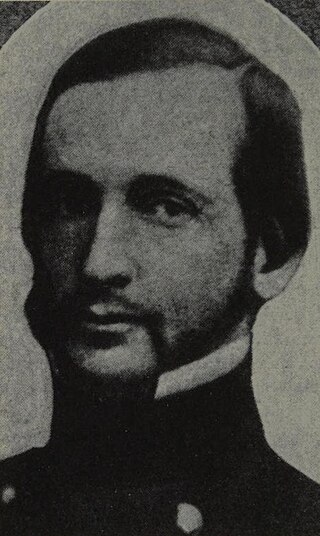
Robert Selden Garnett was a career military officer, serving in the United States Army until the American Civil War, when he became a Confederate States Army brigadier general. He was the first general officer killed in the Civil War.
Michael Louis Vespoli is a former American rower and rowing coach. He is the founder and chief executive officer of Vespoli USA, Inc., a boat manufacturer in New Haven, Connecticut, that makes shells for rowing teams and individual rowers. Vespoli was born in New Haven, Connecticut.
Edward Perry "Ed" Bass is an American businessman, financier, philanthropist and environmentalist who lives in Fort Worth, Texas. He financed the Biosphere 2 project, an artificial closed ecological system, which was built between 1987 and 1991. He is the chairman of Fine Line, an investment and venture-capital management firm in Fort Worth, and Chairman of the board of directors of the Sid W. Richardson Foundation, a philanthropic organization. He was listed as #239 on the Forbes 400 list of wealthiest Americans in 2012, with an estimated net worth of $2 billion.

William Edwin Starke was a wealthy Gulf Coast businessman and a brigadier general in the Confederate States Army during the American Civil War. He was killed in action at the Battle of Antietam while commanding the famed "Stonewall Division," a unit first made famous under Stonewall Jackson.
Alexander Yelverton Peyton Garnett was an American physician. He was President of the American Medical Association, and served Jefferson Davis and Robert E. Lee during the American Civil War. He was a graduate of the George Washington University Medical School.
The Battle of Garnett's and Golding's Farms took place June 27–28, 1862, in Henrico County, Virginia, as part of the Seven Days Battles of the American Civil War's Peninsula Campaign. While the battle at Gaines's Mill raged north of the Chickahominy River, the forces of Confederate general John B. Magruder conducted a reconnaissance in force that developed into a minor attack against the Union line south of the river at Garnett's Farm. The Confederates attacked again near Golding's Farm on the morning of June 28 but in both cases were easily repulsed. The action at the Garnett and Golding farms accomplished little beyond convincing McClellan that he was being attacked from both sides of the Chickahominy.
References
- 1 2 (25 May 1968). Lee Garnett Day, Explorer, was 78; Retired Executive of General Foods, Ex-Colonel, Dies, The New York Times , p. 35 (paywall)
- ↑ (29 December 1914). Off to Explore Unknown Jungles, Brattleboro Daily Reformer